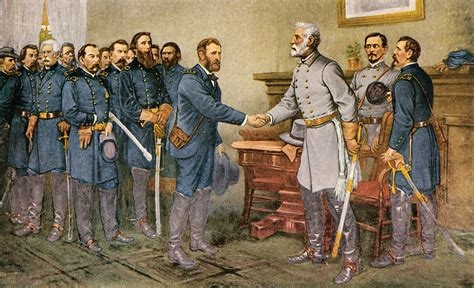April 9, 1865 – Confederate General Robert E. Lee surrenders his army to Union General Ulysses S. Grant at Appomattox Court House, Virginia. For more than a week, Lee had tried to outrun Grant to the west of Richmond and Petersburg. After a ten-month siege of the two cities, the Union forces broke through the defenses and forced Lee to retreat. The Confederates moved along the Appomattox River, with Union General Phillip Sheridan shadowing them to the south. Lee’s army had little food, and they began to desert in large numbers on the retreat. When Lee arrived at Appomattox, he found that his path was blocked. He had not choice but to request a meeting with Grant. They met at a house in Appomattox at 2:00 p.m. on the afternoon of April 9. Lee was resplendent in his dress uniform and a fine sword at his side. Grant arrived wearing a simple soldier’s coat that was muddy from his long ride. The great generals spoke of their service in the Mexican War, and then set about the business at hand. Grant offered generous terms. Officers could keep their side arms, and all men would be immediately released to return home. Any officers and enlisted men who owned horses could take them home, Grant said, to help put crops in the field and carry their families through the next winter. These terms, said Lee, would have “the best possible effect upon the men,” and “will do much toward conciliating our people.” The papers were signed and Lee prepared to return to his men. In one of the great ironies of the war, the surrender took place in the parlor of Wilmer McClean’s home. McClean had once lived along the banks of Bull Run, the site of the first major battle of the war in July 1861. Seeking refuge from the fighting, McClean decided to move out of the Washington-Richmond corridor to try to avoid the fighting that would surely take place there. He moved to Appomattox Court House only to see the war end in his home. Although there were still Confederate armies in the field, the war was officially over. Four years of bloodshed had left a devastating mark on the country: 360,000 Union and 260,000 Confederate soldiers had perished during the Civil War.
April 9, 1865 – Confederate General Robert E. Lee surrenders his army to Union General Ulysses S. Grant at Appomattox Court House, Virginia. For more than a week, Lee had tried to outrun Grant to the west of Richmond and Petersburg. After a ten-month siege of the two cities, the Union forces broke through the defenses and forced Lee to retreat. The Confederates moved along the Appomattox River, with Union General Phillip Sheridan shadowing them to the south. Lee’s army had little food, and they began to desert in large numbers on the retreat. When Lee arrived at Appomattox, he found that his path was blocked. He had not choice but to request a meeting with Grant. They met at a house in Appomattox at 2:00 p.m. on the afternoon of April 9. Lee was resplendent in his dress uniform and a fine sword at his side. Grant arrived wearing a simple soldier’s coat that was muddy from his long ride. The great generals spoke of their service in the Mexican War, and then set about the business at hand. Grant offered generous terms. Officers could keep their side arms, and all men would be immediately released to return home. Any officers and enlisted men who owned horses could take them home, Grant said, to help put crops in the field and carry their families through the next winter. These terms, said Lee, would have “the best possible effect upon the men,” and “will do much toward conciliating our people.” The papers were signed and Lee prepared to return to his men. In one of the great ironies of the war, the surrender took place in the parlor of Wilmer McClean’s home. McClean had once lived along the banks of Bull Run, the site of the first major battle of the war in July 1861. Seeking refuge from the fighting, McClean decided to move out of the Washington-Richmond corridor to try to avoid the fighting that would surely take place there. He moved to Appomattox Court House only to see the war end in his home. Although there were still Confederate armies in the field, the war was officially over. Four years of bloodshed had left a devastating mark on the country: 360,000 Union and 260,000 Confederate soldiers had perished during the Civil War.
0 Comments
0 Shares
173 Views





